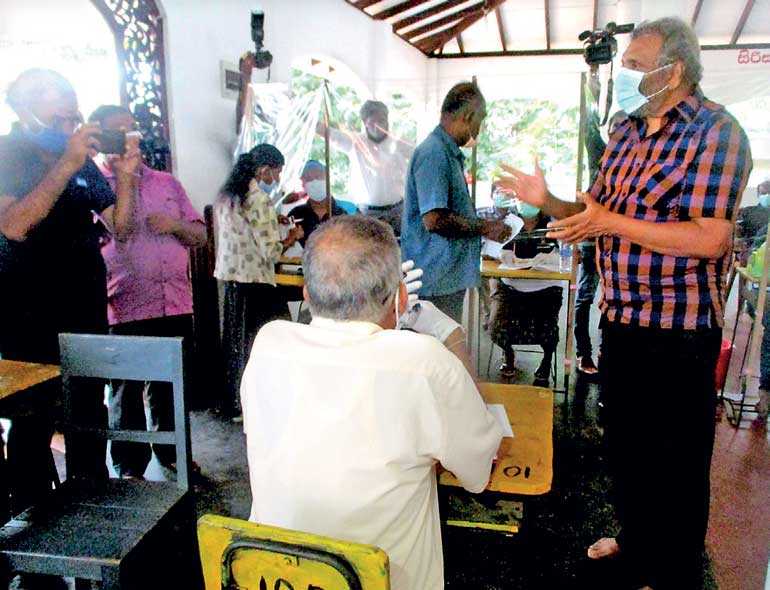Wednesday Feb 18, 2026
Wednesday Feb 18, 2026
Tuesday, 16 June 2020 00:01 - - {{hitsCtrl.values.hits}}

The Election Commission (EC) held a mock election in Vilegoda in Ambalangoda on 7 June as per COVID-19 guidelines to ascertain the feasibility of conducting the forthcoming Parliamentary Poll in keeping with health regulations
By a special correspondent
The world has been engulfed with COVID-19, which respects neither rich nor the poor, the powerful and the powerless, the educated and the uneducated. So, it is in that context, that even the world’s superpower nations in the world, the United States and China have been humbled by this pandemic.
Sri Lanka was scheduled to have a snap Parliamentary poll, initially on 25 April but it was later postponed to 20 June due to the lockdown initiated island-wide. President Gotabaya Rajapaksa was keen to establish a majority government with his coalition parties. The previous Parliamentary majority was unclear with both the Sri Lanka Podujana Peramuna (SLPP) and United National Party (UNP) having similar number of MPs and the change of Prime Minister and Cabinet following the 16 November 2019 Presidential Elections.
The current Opposition was opposed to holding of the elections, claiming that the polls cannot be morally held with the COVID-19 threat looming over the population, arguing that public safety should take top priority. However, the same UNP while in government failed to uphold the public safety and resulted in the devastating loss of lives in the Easter Sunday bomb attacks and led to an economic downturn.
Additionally, the opposition parties and civil society organisations have filed legal remedy to postpone the upcoming elections and temporary re-instate the dissolved parliament. As one understands, opposition cannot present legislative bills and SLPP government is unable to pass any legislative bills due to being a minority government.
By analysing the recently held Local Government Council polls and the Presidential Elections, speculation is rife that the UNP, SJB and JVP would both be facing resounding defeats in the event the Parliamentary polls would be held as scheduled. And the governing SLPP is favourable within their constituents now that Gotabaya Rajapaksa occupies the presidential seat. The same trend is likely to follow with the Provincial Council polls which have been overdue for more than three years. It is ironic that the Party that introduced white elephant provincial councils in 1987, had delayed the provincial elections when in government and the Tamil National Alliance (TNA) didn’t bring any legal recourse to remedy this.
Further, Sri Lanka has held elections in arguably more threatening times in 1988 (Presidential Elections) and 1989 (Parliamentary Elections) when the dual insurgency was running in the north and the south.
One might also argue that this may be a good opportunity to hold elections without usual tamashas of large political rallies and associated election violence. Another matter which is worthy of special mention is that with the outbreak of COVID-19 and the corresponding curfew there would be much restrictions in the street parades and the shouting matches of the various political parties which eventually turn out to be emotional wrangles!
There are the intra-party squabbles where members of the same political parties fight for the votes as the preferential voting systems has still not been abolished! There will be inter-party fights as well which there will be allegations of corruption and such like differences of opinions as well which would even end up in assaults and killings as we have seen in the past as well.
Now, it is up to the Sri Lankan polity also to conduct elections like in other countries where the policies are declared through the media so that the candidates are aware of what policies the prospective governments are delivering. On the other hand, the unfulfilled promises that past governments have failed to deliver, could also leave much disgust among voters.
With the election of the 2015 Parliamentary Elections, all Members of Parliament had the golden opportunity of bringing in a hybrid of the First- Past- the Post system and the Proportional Representation System, which would have given a comfortable working majority for the wining party or a consortium of parties which formed the Government, a comfortable working majority to form the government. This would have meant that there would have been no necessity to keep all the political parties content which would not have had the necessity to dangle Cabinet portfolios to keep them happy in lieu of their support.
They also missed the opportunity of having the electorate system and not the district-wise system which meant that the canvassing within the electorate system would have meant that their reach of the geographical areas would have been much smaller rather than the entire district. The canvassing for an entire district would have been much more exhaustive rather than a small electorate which would mean that the promotions of a single district would have been much more expensive and would lead to higher levels of corruption, which would also mean that the prospective MP would be financially obliged to provide benefits to his clients such as contracts when he comes into power.
During the 2015 ‘100-day government’, the parliament missed an opportunity to amend the parliamentary election system by implementing hybrid of the First- Past- the Post system and the Proportional Representation System
While the ruling party is determined to hold the parliamentary polls fast, the Opposition parties are also fighting to stop that, citing the COVID-19 as an excuse.
However, whatever the theories of various political parties are, ultimately what matters is the right of the voters, which have to be given the pride of place, now that Sri Lanka, in another 11 years, will be celebrating a centenary of adult franchise in 1931.